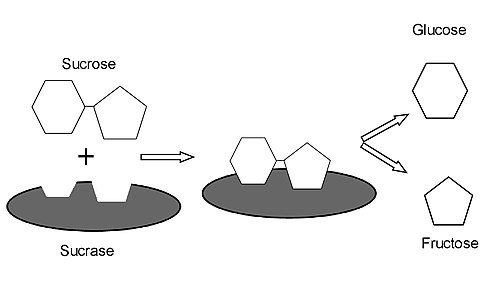Glucosenoun
(carbohydrate) A simple monosaccharide (sugar) with a molecular formula of C6H12O6; it is a principle source of energy for cellular metabolism.
Glucosenoun
A variety of sugar occurring in nature very abundantly, as in ripe grapes, and in honey, and produced in great quantities from starch, etc., by the action of heat and acids. It is only about half as sweet as cane sugar. Called also dextrose, grape sugar, diabetic sugar, and starch sugar. See Dextrose.
Glucosenoun
Any one of a large class of sugars, isometric with glucose proper, and including levulose, galactose, etc.
Glucosenoun
The trade name of a sirup, obtained as an uncrystallizable reside in the manufacture of glucose proper, and containing, in addition to some dextrose or glucose, also maltose, dextrin, etc. It is used as a cheap adulterant of sirups, beers, etc.
Glucosenoun
a monosaccharide sugar that has several forms; an important source of physiological energy
Glucosenoun
a simple sugar which is an important energy source in living organisms and is a component of many carbohydrates.
Glucosenoun
a syrup containing glucose and other sugars, made by hydrolysis of starch and used in the food industry.
Glucose
Glucose is a simple sugar with the molecular formula C6H12O6. Glucose is the most abundant monosaccharide, a subcategory of carbohydrates.
Fructosenoun
(carbohydrate) A monosaccharide ketose sugar, formula C6H12O6.
Fructosenoun
Fruit sugar; levulose.
Fructosenoun
a simple sugar found in honey and in many ripe fruits
Fructosenoun
a sugar of the hexose class found especially in honey and fruit.
Fructose
Fructose, or fruit sugar, is a ketonic simple sugar found in many plants, where it is often bonded to glucose to form the disaccharide sucrose. It is one of the three dietary monosaccharides, along with glucose and galactose, that are absorbed directly into blood during digestion.









